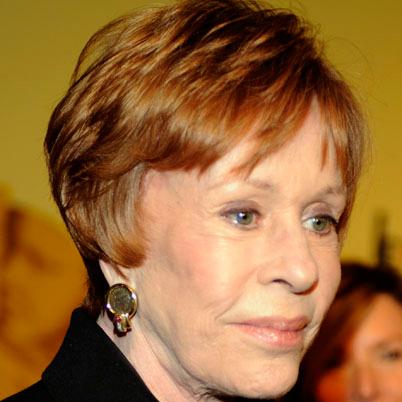Carol Burnett, a legendary, triple-threat (television-movies-stage) performer, has been named the recipient of the 2013 Mark Twain Prize for American Humor.
It’s about time. Burnett brings the award back to a lifetime achievement award status with — at the age of 80 — a rich, if probably not yet finished, career to her credit. Her 11-year-television show, named after her, full of skits with idiosyncratic sidekicks, regulars and notable guests making appearances, was named one of the 100 best television shows ever.
The prize gives Burnett the distinction of being one of the few artists of any sort to win both a Kennedy Center Honor and a Mark Twain Prize, and the only woman to do so.
There have been, in fact, five women awarded the Mark Twain Prize, three in the last four years, counting Burnett. Ellen DeGeneres, the sparkling sitcom star, standup comedian and star of her own talk show won last year. Two years ago Tina Fey, the popular Saturday Night Live regular, star of her own sitcom and a number of films, was awarded the prize at the tender age of 40, with the kind of resume that could pass for a footnote on Burnett’s career. Whoopi Goldberg and Lily Tomlin have also won the prize.
If you look at Burnett’s life, times and professional career—let’s not forget her appearances on “All My Children,” a daytime soap opera of which she was a super fan and in which she made several appearances as Verla Grubbs, the long-lost daughter of Langley Wallingford—she strung together acts of magic and creation.
Sure, she was a comedienne—and a sometime hoofer, a Broadway star, a television super-star and finally a much beloved legend—but perhaps the best compliment you can throw her is that she was a fine, remarkable actress, because all those klutzy characters, those loud, insecure seekers of attention, those skits and sketches and send-ups of famous and infamous people, were about acting. As somebody wise once said, it’s easy to do tragedy, but comedy is hard.
Burnett is one of those true believers—in herself—who came out on top by sheer force of perseverance. She grew up in tough circumstances, raised in Texas and then California by a grandmother. She studied journalism, but when the acting bug bit her, well, she’s still got the teeth marks. Look at the record: “The Carol Burnett Show” lasted 11 years, had an average of 30 million viewers in pre-cable days. She or her show received 25 Emmy Awards, 12 People’s Choice Awards, eight Golden Globes, the Horatio Alger Award, the Peabody Award and the Presidential Medal of Freedom. She is a member of the Television Hall of Fame and has an entire square named after her in Los Angeles.
And she has friends, slews of them, in a business not noted for its kindness. But Carol Burnett is just that—and she’s always preternaturally funny.
Did we forget—she’s written three books and a play, which she co-wrote with her late daughter Carrie, who passed away from cancer four months before it was scheduled to open in Chicago? “Hollywood Arms,” directed by Hal Rince, opened on Broadway in 2012.
Playing in clubs and staging her own musical revue, she struggled in New York until she ended up singing a song she made famous, the satirical “I Made a Fool of Myself Over John Foster Dulles” on television. A star turn in the comedic musical, “Once Upon a Mattress,” came next and was followed later by an Emmy-Award winning special, “Julie and Carol at Carnegie Hall,” which was performed with her good friend and star Julie Andrews. Burnett’s own show debuted in 1967.
You could find regulars like Tim Conway, Harvey Korman, Vicki Lawrence and Lyle Waggoner, who had nothing in common except talent that was, like that of the star of the show, unique, original and one-of-a-kind. Over the years, stars Lucille Ball, Ella Fitzgerald, Liza Minelli, Rock Hudson, Jimmy Stewart, Gloria Swanson, Betty White, Cher, Dick Van Dyke and, yes, Ronald Reagan appeared on her show.
The constant was Burnett. She was always funny, often endearing, seemingly made of three left feet, but always human. When you saw her on stage, in your living room, at a lecture hall, in a movie, you always saw a piece of yourself and the voice was instantly recognizable, whether you were a man, woman or child, old, young or confused. She knew how to play the full scale of what performers can do and that’s what made her a great comedienne as well as a great actress.
She lent her quirky and believably humorous qualities to films: “The Four Seasons,” the remarkably powerful “Friendly Fire” on television and numerous other projects. We spotted her once playing a black widow serial killer on “Law and Order: SVU,” where she managed to be both scary and touching.
Mark Twain would indeed be pleased.


